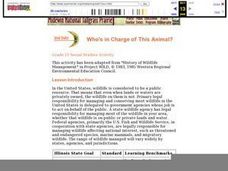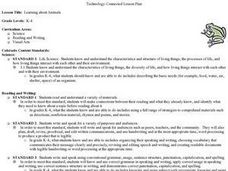Curated OER
Flora and Fauna of the Hill Neighborhood
Students compare and contrast the characteristics of plants and animals. In this ecology activity, students observe the outdoors and describe the relationship among different living things. They relate plant diversity with animal diversity.
Curated OER
What Happened to Robin?
Students investigate animal injuries caused by humans. They present their findings to various neighborhood groups.
Curated OER
Character Building from Inside Out
Students relate the facial muscle location with a person's expressions. In this visual arts lesson, students write a fictional story about a character. They use digital cameras and computer softwares to create an animation film about it.
Curated OER
Debate over Branding
The advantages and disadvantages of cattle branding are discussed. The class breaks into two groups to further consider each viewpoint. The lesson plan says that the class will read an article about the ongoing debate, but this article...
Curated OER
Animal Life Cycles
Students participate in numerous activities to gather information about parts of the life cycle. In this life science instructional activity, the teacher choose from a number of activities to create or support an interdisciplinary unit...
Curated OER
Who's in Charge of This Animal?
Eleventh graders study wildlife management and identify the appropriate government agencies that are in charge. They examine different wildlife management techniques. They write a letter showing interest in the activities of one of the...
Curated OER
Solar System
Explore the solar system in detail, from it's origins to its components. Visual data gathered by actual space missions has been used to create the images and animations on each page of this stellar electronic book about the solar...
Curated OER
Where are the Dinosaurs?
Students understand what it means when an animal is extinct. In this dinosaur lesson, students create dinosaur dioramas showing their habitat and what in their environment might make them become extinct. students pay particular attention...
MOST
What Are Cells?
What's in a cell, anyway? Kids read informational text on what makes up both animal and plant cells, including a page of vocabulary terms they will need to be familiar with (cytoplasm, ribosomes, vacuoles, etc.). Full-color images make...
Curated OER
Fine Art to Animation With Keith Haring
Fifth graders create their own morphes in the computer lab emphasizing lines and color and explain them. In this art lesson plan, 5th graders base their creations on the work of Keith Haring.
Curated OER
Wright Again: 100 Years of Flight
Aspiring aeronautical engineers demonstrate different forces as they construct and test paper airplanes. This lesson plan links you to a website that models the most effective paper airplane design, an animation describing the forces...
Curated OER
Chrysanthemum
Our uniqueness should be celebrated, not teased. The story Chrysanthemum addresses having a distinct name and dealing with different perceptions. Pre- and post-reading questions are listed to help your learners understand and make...
Curated OER
What's the Difference?
Young scholars analyze the similarities in different species. This instructional activity is part of a multi-segmented unit on the diversity of life. In this segment, students classify shoes to mimic the scientific categories of the...
Curated OER
Learning about Animals
Pupils chose one animal to research. They research the animal using the internet using the sites provided. They also research using books from the library. They conclude the lesson by writing a one page story about their animal which...
Curated OER
Living Labels
Young scholars, after being introduced to and researching the wildlife diversity in Arizona, practice developing questioning skills while identifying the identity of an unknown animal based upon clues provided by classmates. They are...
Curated OER
Goals of the Diversity of Life Unit
Students are introduced to the unit on the importance of diversity of life and the role that interdependence plays in our worlds. this is part of a multi-lesson unit on the diversity of life.
Curated OER
Camouflage
Here is a lesson which incorporates ingenious hands-on activities that simulate how many animals use camouflage as a survival technique. This lesson clearly outlines how to implement the activities and discussion sessions found in it....
Howard Hughes Medical Institute
Population Dynamics
Will human population growth always be exponential, or will we find a limiting factor we can't avoid? Young scientists learn about both exponential and logistic growth models in various animal populations. They use case studies to...
TED-Ed
History vs. Vladimir Lenin
Vladimir Lenin is on trial in an engaging, animated video where the merits and consequences of the formation of the Soviet Union and Lenin's actions are reviewed. This is a great way to illustrate how to establish and argue unique...
ARKive
Species Discovery
How many of your students know that even today new species are being found all over the globe? Introduce them to the amazing diversity our planet houses with a creative activity about animal variation and classification. They'll use a...
Curated OER
Wildlife Variety Show: Biodiversity In Illinois
Eighth graders write a short report in first person about any plant or animal found on a list of Illinois species. They become the character of the plant or animal and give a short report describing the plant or animal.
Curated OER
Structure and Function of the Cell/Introduction to the Cell
So, this is not technically a learning exercise, but rather a chapter of reading material, pictures, and diagrams introducing young biologists to the cell. Cell theory, diversity, size, and shape are described. The internal organization...
California Academy of Science
Snakes and Lizards Length and Movement
Snakes and lizards can be very tiny or very long. Your class will get out their rulers to see just how big snakes and lizards can be. They discuss several different reptiles by reading the included animal fact cards, then each small...
Association of Fish and Wildlife Agencies
Schoolyard Biodiversity Investigation Educator Guide
In 1980, in the tropical rainforests of Panama, scientists discovered 1,200 species of beetles living in and around just 19 trees, with most of the species new to science—that's biodiversity! In the activity, learners work in teams to...
Other popular searches
- Diversity of Animal Kingdom
- Plant and Animal Diversity
- Animal Diversity Project
- Animal Diversity World
- Biology Animal Diversity
- Animal Diversity Field Study
- Animal Diversity Jaguar
- Intro Animal Diversity
- Animal Diversity Observation
- Animal Diversity Africa
- Animal Diversity Lessons
- Kingdom Animal Diversity

























